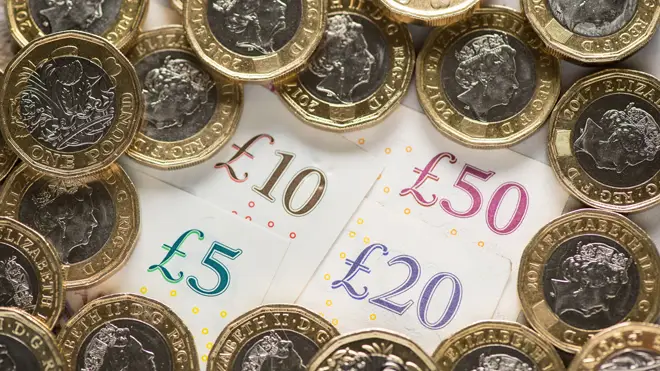
Simon Marks 3pm - 7pm
4 December 2020, 06:51 | Updated: 4 December 2020, 07:17

The Bank of England has been urged by MPs to investigate where £50bn of "missing" UK cash might be.
The issue was first raised by the National Audit office in September and now the Public Accounts Committee (PAC) has called on the Bank to look into the matter.
The committee of MPs has said that billions of pounds worth of cash was either "stashed somewhere" in places like people's homes or was being used illegally.
The committee said there are implications for public policy and the public purse if the large volume of banknotes whose whereabouts or use are unknown are being used illegally.
The PAC said the Bank of England needs to explain "why the demand for notes keeps increasing," adding that it does not have any real understanding of where around £50 billion of issued sterling notes are.
It acknowledged that other major currencies have seen a similar trend.
The Bank estimates that 20% to 24% of issued notes are used or held for cash transactions. This leaves about £50 billion of issued banknotes that may be being used overseas for transactions or savings, or held in the UK as unreported household savings or for use in the shadow economy.
Meg Hillier, chairwoman of the Public Accounts Committee, said: "In many areas where you can use cash you'd be hard pressed to find it, at least without paying an ATM fee that may be a substantial percentage of a small withdrawal - yet making frequent, small withdrawals can be a key budgeting tool for those on low incomes, and least able to afford those fees.
"Conversely, £50 billion of sterling notes - or about three-quarters of this precious and dwindling supply - is stashed somewhere but the Bank of England doesn't know where, who by or what for - and doesn't seem very curious.
"It needs to be more concerned about where the missing £50 billion is.
"Depending where it is and what it's being used for, that amount of money could have material implications for public policy and the public purse. The Bank needs to get a better handle on the national currency it controls."
Concerns were also raised about high stock levels of cash.
At the end of July, the Bank held contingency stocks with a value of £30.4 billion, against minimum guidance levels of £15.6 billion.
The committee said: "We recognise that the Bank would not wish to risk running out of notes. However, we do not understand the Bank's rationale for holding such high levels of stocks."
The Royal Mint and the Treasury should also set out how they are ensuring plans for manufacturing coins are sustainable and cost effective, the report said.
By March, the Mint had no plans to manufacture any 2p or £2 coins.
Although there has been a recent increase in demand for coins during the coronavirus pandemic, this is expected to be temporary, the report said.
The committee said the oversight of the production and distribution of banknotes and coins is unclear and fragmented.
There are gaps in oversight of the cash system where no one appears to be responsible, such as monitoring how well it performs, or the extent to which businesses are continuing to accept cash, the report said.
The Treasury should give overall responsibility for the cash system to a single body, with the other bodies having clearly defined supporting roles, it recommended.
By the end of March at the latest, the Treasury should publish a clear plan of action, including draft legislation for securing access to cash across the UK.
The plan should include clear commitments, including spelling out what the regulators are expected to achieve, the committee said.